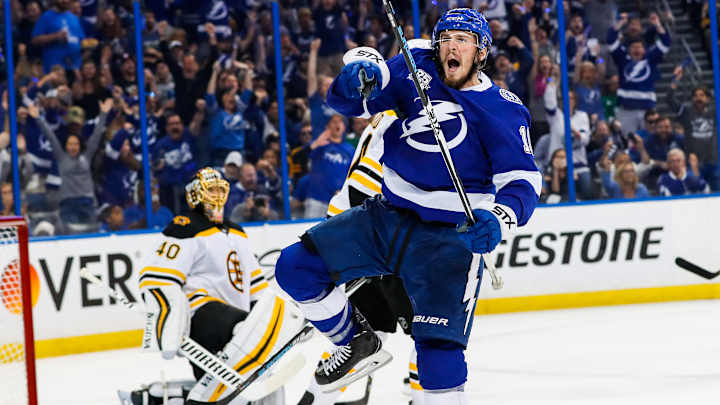After a Dismal Series Start, Tampa Bay Quickly Regrouped to Reach Eastern Conference Final

TAMPA — The dressing room doors opened and here came the media horde, stampeding across the carpet toward the faraway stall. As the boom mics and cameras rushed past his seat near the entrance, Lightning defenseman Ryan McDonagh surveyed the spectacle with amusement. “Cinco De Milly over here,” he deadpanned, a bogus holiday nonetheless befitting the occasion. And why not? May 5 is deservedly reserved for honoring Mexico’s 19th-century victory over France in the Battle of Puebla, but May 6, 2018 was all about Tampa Bay, fueled by J.T. Miller’s power-play salvo, polishing off Boston in Game 5 of these Eastern Conference semifinals.
Unlike the underdog Mexican army that valiantly fought back its foreign invaders despite a sizable disadvantage in both weaponry and manpower 156 years ago, the Lightning were hardly overmatched entering Sunday afternoon at Amalie Arena. They led the NHL in goals per game during the regular season (3.54) and secured the best record in franchise history (54-23-5), a late-March lull notwithstanding, before pummeling New Jersey to open the Stanley Cup playoffs without much of a sweat. Then came a soul-searching stumble in Game 1 against the Bruins, enough to make the thought of four straight wins seem like an impossible target.
“The vibe in the room was, we were right there with them,” McDonagh said, “but in reality we had some meetings and realized we weren’t anywhere close to where we needed to be.”
A Look at the Possible Consequences of Brad Marchand's Tactic of Licking Opponents
The long march from that 6-2 defeat to this 3-1 clincher—secured when defenseman Anton Stralman sent a loose puck 159 feet into an empty net with 89 seconds left—was not easy for Tampa Bay. It featured a yeoman’s effort from rookie center Brayden Point, “the best player in the series” according to coach Jon Cooper, locking down the Bruins’ vaunted Brad Marchand-Patrice Bergeron-David Pastrnak trio at even strength and scoring an unassisted tally for a 1-1 tie. It required 27 saves from ice-blooded goalie Andrei Vasilevskiy and an oft-maligned penalty kill buckling down when McDonagh was whistled for tripping late in the third period. “You get a little nervous, but I think we kept a cool head,” Stralman said. "We stepped up at the right time."
It was punctuated by the loop-de-loop, give-and-go goal between Miller and Nikita Kucherov along the right half-wall, which might as well have hypnotized netminder Tuukka Rask to sleep before Miller pummeled the puck over his glove shoulder. They had tried the same sequence during the Devils series, probing for a one-timer from Miller in the slot, but never quite connected. “We learned that’s a Grade-A [chance],” Miller said later. “That’s hard to come by, even on the power play. If we get a chance to mix it in … we put it in the bank for hopefully a situation like this, and obviously super pumped it worked.”
Down the hallway, the Bruins were busy packing their bags and digesting the start of summer. They did not score at even strength after Game 2 and received zero goals from their bottom-six forwards across the series. They lost defenseman Torey Krug to an ankle injury in Game 4, then saw grinder David Backes exit with an apparent head injury on a hard check by Miller midway through the second period in Game 5, sandwiched between Point and Miller’s goals. “If we’re going to look back throughout the whole season, I think there is a lot we can be proud of,” captain Zdeno Chara said. “A lot of people didn’t expect us to be a playoff team. A lot of people didn’t expect us to be a 50-win team … But, yeah, at this moment it’s disappointment.”
For the Lightning? Elation, but also relaxation. While Pittsburgh and Washington slug out the rest of their series in the other conference semi—Game 6 is scheduled for Monday at PPG Paints Arena with the Capitals up 3-2—they can kick back and recharge. In 2015, Tampa Bay played a whopping 20 games before reaching the Stanley Cup final, one shy of the maximum. Now it has earned the spoils of a second straight long rest, critical for however long this run extends. “We’ll enjoy it for a couple days,” said Miller, “and then it’s back to work.”
